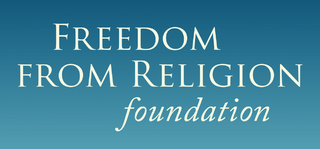Related Research Articles

The Freedom From Religion Foundation (FFRF) is an American nonprofit organization that advocates for atheists, agnostics, and nontheists. Formed in 1976, FFRF promotes the separation of church and state, and challenges the legitimacy of many federal and state programs that are faith-based. It supports groups such as nonreligious students and clergy who want to leave their faith.
Allen v. Wright, 468 U.S. 737 (1984), was a United States Supreme Court case that determined that citizens do not have standing to sue a federal government agency based on the influence that the agency's determinations might have on third parties.
Abuse of power or abuse of authority, in the form of "malfeasance in office" or "official abuse of power", is the commission of an unlawful act, done in an official capacity, which affects the performance of official duties. Malfeasance in office is often a just cause for removal of an elected official by statute or recall election. Officials who abuse their power are often corrupt.
Bob Jones University v. Simon, 416 U.S. 725 (1974), is a decision by the Supreme Court of the United States holding that Bob Jones University, which had its 501(c)(3) status revoked by the Internal Revenue Service for practicing "racially discriminatory admissions policies" towards African-Americans, could not sue for an injunction to prevent losing its tax-exempt status. The question of Bob Jones University's tax-exempt status was ultimately resolved in Bob Jones University v. United States, in which the court ruled that the First Amendment did not protect discriminatory organizations from losing tax-exempt status.
A 501(c)(3) organization is a United States corporation, trust, unincorporated association or other type of organization exempt from federal income tax under section 501(c)(3) of Title 26 of the United States Code. It is one of the 29 types of 501(c) nonprofit organizations in the US.

Todd P. Graves is a private practice attorney and Republican politician, who previously served as United States Attorney for the Western District of Missouri. A twice-elected state prosecutor who is currently in private practice with the law firm Graves Garrett LLC, his practice focuses on representing individuals and businesses nationwide before federal and state courts and administrative agencies. Graves was born and raised in Tarkio, Missouri. His brother is U.S. Representative Sam Graves. On January 7, 2017, Graves was elected with unanimous support by the Missouri Republican State Committee to serve as Chairman of the Missouri Republican Party.

Scientology status by country describes the status of Scientology and its recognition as a religion in varying contexts or in different countries. The Church of Scientology pursues an extensive public relations campaign for state recognition of Scientology as a religion.

The Tea Party movement was an American fiscally conservative political movement within the Republican Party that began in 2009. Members of the movement called for lower taxes and for a reduction of the national debt and federal budget deficit through decreased government spending. The movement supported small-government principles and opposed government-sponsored universal healthcare. The Tea Party movement has been described as both a popular constitutional movement and as an "Astro Turf operation" purporting to be spontaneous and grassroots, but created by hidden elite interests. It was composed of a mixture of libertarian, right-wing populist, and conservative activism. It has sponsored multiple protests and supported various political candidates since 2009. According to the American Enterprise Institute, various polls in 2013 estimated that slightly over 10% of Americans identified as part of the movement.

The Internal Revenue Service (IRS) is the revenue service for the United States federal government, which is responsible for collecting U.S. federal taxes and administering the Internal Revenue Code, the main body of the federal statutory tax law. It is an agency of the Department of the Treasury and led by the Commissioner of Internal Revenue, who is appointed to a five-year term by the President of the United States. The duties of the IRS include providing tax assistance to taxpayers; pursuing and resolving instances of erroneous or fraudulent tax filings; and overseeing various benefits programs, including the Affordable Care Act.
Nonpartisanism in the United States is organized under United States Internal Revenue Code that qualifies certain non-profit organizations for tax-exempt status because they refrain from engaging in certain political activities prohibited for them. The designation "nonpartisan" usually reflects a claim made by organizations about themselves, or by commentators, and not an official category per American law. Rather, certain types of nonprofit organizations are under varying requirements to refrain from election-related political activities, or may be taxed to the extent they engage in electoral politics, so the word affirms a legal requirement. In this context, "nonpartisan" means that the organization, by US tax law, is prohibited from supporting or opposing political candidates, parties, and in some cases other votes like propositions, directly or indirectly, but does not mean that the organization cannot take positions on political issues.
The Friends of Abe, Inc. (FOA) was a support and networking group for politically conservative members of the film industry in Hollywood. The organization was formed in 2004 by actor Gary Sinise.

True the Vote (TTV) is a conservative vote-monitoring organization based in Houston, Texas whose stated objective is stopping voter fraud. The organization supports voter ID laws and trains volunteers to be election monitors and to spot and bring attention to suspicious voter registrations that its volunteers believe delegitimize voter eligibility. The organization's founder is Catherine Englebrecht.

In 2013, the United States Internal Revenue Service (IRS), under the Obama administration, revealed that it had selected political groups applying for tax-exempt status for intensive scrutiny based on their names or political themes. This led to wide condemnation of the agency and triggered several investigations, including a Federal Bureau of Investigation (FBI) criminal probe ordered by United States Attorney General Eric Holder. Conservatives claimed that they were specifically targeted by the IRS, but an exhaustive report released by the Treasury Department's Inspector General in 2017 found that from 2004 to 2013, the IRS used both conservative and liberal keywords to choose targets for further scrutiny.

Lois Gail Lerner is an American attorney and former United States federal civil service employee. Lerner became director of the Exempt Organizations Unit of the Internal Revenue Service (IRS) in 2005, and subsequently became the central figure in the 2013 IRS targeting controversy in the targeting of politically-aligned groups, either denying them tax-exempt status outright or delaying that status until they could no longer take effective part in the 2012 election. On May 10, 2013, in a conference call with reporters, Lerner apologized that Tea Party groups and other groups had been targeted for audits of their applications for tax-exemption. Both conservative and liberal groups were scrutinized. Only three groups — all branches of the Democratic group Emerge America — had tax exemptions revoked. Lerner resigned over the controversy. An investigation by the U.S. Department of Justice and Federal Bureau of Investigation, completed in 2015, found "substantial evidence of mismanagement, poor judgment and institutional inertia" but "found no evidence that any IRS official acted based on political, discriminatory, corrupt, or other inappropriate motives that would support a criminal prosecution."

Citizens for Self-Governance (CSG) is a conservative American nonprofit political organization. In 2015, it launched a nationwide initiative calling for a convention to propose amendments to the United States Constitution to reduce federal spending. The group's efforts are focused on imposing fiscal restraint on Washington D.C., reducing the federal government's authority over states, and imposing term limits on federal officials. As of 2023, the organization's resolution had passed in 19 states. A total of 34 states would need to pass such a resolution in order for a Convention to Amend the Constitution to be called per Article V. The organization funded and won a class action lawsuit against the Internal Revenue Service over the agency's politically oriented targeting of conservative organizations. The group is based in Austin, Texas.

The bill H.Res. 565, official title "Calling on Attorney General Eric H. Holder, Jr., to appoint a special counsel to investigate the targeting of conservative nonprofit groups by the Internal Revenue Service," was passed by the United States House of Representatives during the 113th United States Congress. The simple resolution asks U.S. Attorney General Eric Holder to appoint a special counsel to investigate that 2013 IRS scandal. The Internal Revenue Service revealed in 2013 that it had selected political groups applying for tax-exempt status for closer scrutiny based on their names or political themes.

H.Res. 574, officially titled Recommending that the House of Representatives find Lois G. Lerner, Former Director, Exempt Organizations, Internal Revenue Service, in contempt of Congress for refusal to comply with a subpoena duly issued by the Committee on Oversight and Government Reform, is a simple resolution that passed in the United States House of Representatives during the 113th United States Congress. The resolution is in response to the testimony of Lois Lerner, a former Internal Revenue Service (IRS) employee, who was at the center of the then-ongoing 2013 IRS controversy over the agency's targeting of selected political groups applying for tax-exempt status. The resolution holds Lois Lerner in contempt of Congress for refusing to testify at a congressional hearing.

The tax status of the Church of Scientology in the United States has been the subject of decades of controversy and litigation. Although the Church of Scientology was initially partially exempted by the Internal Revenue Service (IRS) from paying federal income tax, its two principal entities in the United States lost this exemption in 1957 and 1968. This action was taken because of concerns that church funds were being used for the private gain of its founder L. Ron Hubbard or due to an international psychiatric conspiracy against Scientology.
Richard Pilger is an American attorney and retired government official who served as the Director of the Election Crimes Branch at the Criminal Division of the United States Department of Justice from March 2010 to November 2020, returning to the civil service position in February 2021 through his retirement in July 2022. He is currently an unaffiliated private attorney.
References
- 1 2 IRS Apologizes For Aggressive Scrutiny Of Conservative Groups
- ↑ Justice Department Settles With Conservative Groups Over IRS Scrutiny
- ↑ IRS admits targeting conservatives for tax scrutiny in 2012 election, Washington Post
- ↑ Justice Department Settles With Tea Party Groups After I.R.S. Scrutiny; Emile Cochrane; New York Times; October 26, 2017
- ↑ Tea Party groups settle lawsuit against IRS; agency apologizes for discrimination during Obama's presidency